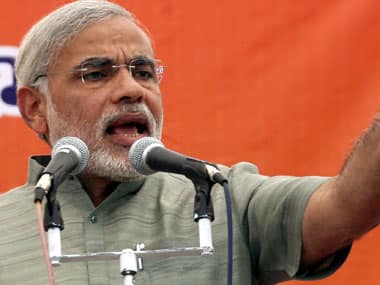Even Modi’s most passionate critics concede that the Gujarat chief minister will win spectacularly in Gujarat in the upcoming Lok Sabha polls. It doesn’t take a genius to say why: Gujarat has been a BJP stronghold for several years now and has voted Modi their CM for three consecutive terms. At the recently concluded state polls, where BJP won handsomely in Madhya Pradesh, Rajasthan and Chhattisgarh, the victory was attributed to the ‘Modi-wave’. A Lokniti, CSDS survey conducted for the IBN poll tracker predicted a 31 percent vote share for the Congress in Gujarat. In 2009, the Congress was at 43 percent and the BJP at 46 percent. The BJP’s vote-share projection now stands at 55 percent in Gujarat indicating a clean sweep for the party. However, the same poll shows that 46 percent of the respondents have agreed to Arvind Kejriwal’s declaration that the Gujarat model of development has only benefitted a few already prosperous sections of the society like the corporate houses. So what accounts for the huge support in favour of the Gujarat CM? During a discussion on CNN IBN, editor-in-chief Rajdeep Sardesai suggested that it could be the feeling of community pride that is driving the support towards Modi. [caption id=“attachment_1463141” align=“alignleft” width=“380”]  Narendra Modi. Agencies.[/caption] “The Gujarati asmita or feeling of pride in the fact that a fellow Gujarati might be poised for PM-hood is working in favour of Modi,” says Sardesai. However, he asked whether that is the only reason for the support for Modi. Columnist Aakar Patel pointed out that issues such as farmer suicides, poverty, malnutrition etc has not been a part of the poll narrative around Gujarat unlike in the case of states such as Maharashtra. “He has done reasonably well in Gujarat. There are no business laws that are different in Gujarat than the rest of the country. Modi has just implemented them well,” said Patel. He also pointed out that the allegations of land scams that Arvind Kejriwal has made against Gujarat are not exclusive to the state. However, Sandeep Shastri of CSDS pointed out that there are definitely some questions in the minds of the voters. To which Sardesai said that the conversation around Gujarat is also predominantly about the fast-track growth it has witnessed. Journalist P Sainath contested the claim and said that while there is fast-track growth, there is also a fast increasing economic divide between the rich and the poor. “If you look at poverty figures, you’ll realise that poverty has declined much faster in Maharashtra and Odisha than it has in Gujarat. However, there is not much talk about it. While the idea of the Gujarat development model is important, the discussion around it is equally important. The Gujarat model like Modi calls it has the mandate of the corporate houses. Everyone from the Tatas to the Ambanis have been praising it to the skies. In fact, Anand Mahindra said that one day the Gujarat model of development will be discussed in China. The media has been drumming up support for it… therefore the focus has remained on the success of the model. There’s no doubt Mr Modi will win handsomely in Gujarat,” said Sainath. However, columnist Swapan Dasgupta objected to Sainath and said that there have been distinctive leaps in development in Gujarat. He pointed out that the biggest issues that Gujarat had been facing prior to Modi becoming the CM don’t exist any more. “Power was a big issue then as was water supply. Your poll shows that power is not an issue anymore and only 4 percent of the respondents are concerned about water supply. If that is not development, what is?” he asked. The poll tracker survey shows that among the issues Gujarat plans to vote on price rise comes first (38% votes) followed by corruption (12%) and unemployment (12%). Journalist Manini Chatterjee, however, pointed out the deeply polarising nature of Modi’s leadership, buttressing the argument that Gujarat has immense economic inequality. From the poll tracker survey, she points out that while the upper castes have given Modi rousing acceptance (almost 70 percent of upper caste voters back Modi), Dalits, adivasis and Muslims don’t. “It shows that just certain sections of the society in Gujarat has benefitted from Modi’s development,” says Chatterjee. Sainath and Chatterjee also suggested that Congress’s weak leadership has also contributed to Modi’s phenomenal rise. ‘There is a lot of criticism against Modi in Gujarat, but the Congress has failed to tap into it. Possibly, that is why Arvind Kejriwal has managed to strike a chord with some people there," said Chatterjee.
The poll shows that 46 percent of the respondents have agreed to Arvind Kejriwal’s declaration that the Gujarat model of development has only benefitted a few already prosperous sections of the society like the corporate houses.
Advertisement
End of Article


)
)
)
)
)
)
)
)
)



